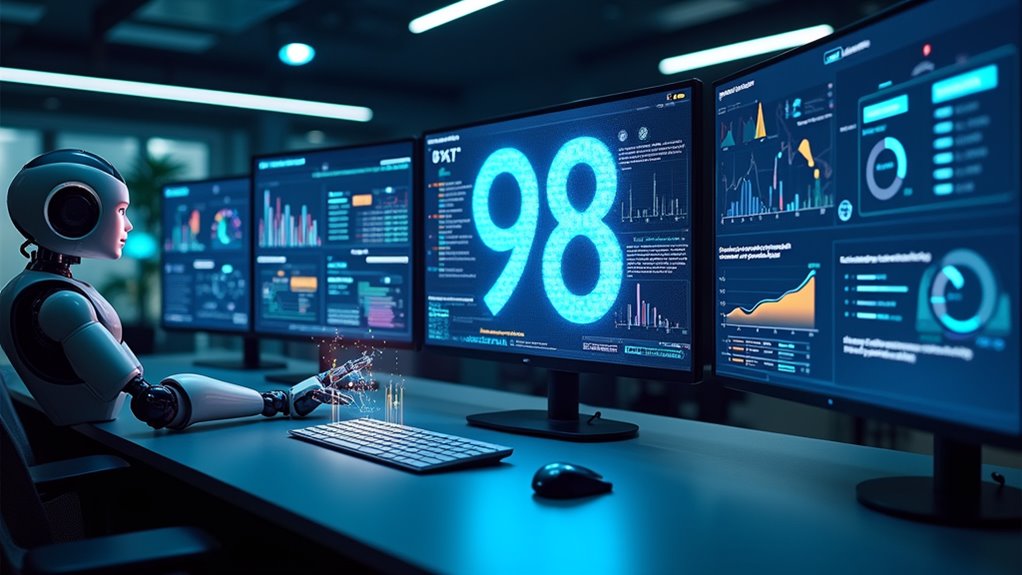Recent research shows that 98% of marketers now use AI in their advertising efforts, with 29% fully integrating it into daily workflows. AI-powered ads deliver twice the effectiveness of traditional approaches while cutting acquisition costs in half. Most businesses aren’t just experimenting—they’re investing heavily, with 67% planning to increase AI spending over the next three years. The competitive edge is clear: companies not leveraging this technology are already falling behind their savvier competitors.

Just how pervasive has artificial intelligence become in the advertising world? The numbers speak volumes: a staggering 98% of marketers now use AI in some form, with 29% having fully integrated it into their daily advertising workflows. It’s not just a fleeting trend—it’s a seismic shift in how businesses approach marketing strategies.
AI adoption has exploded across industries, with 72% of organizations implementing AI for at least one business function. The reason? Simple math. AI-powered ads perform twice as effectively as their traditional counterparts, while AI-driven targeting slashes customer acquisition costs by a whopping 50%. For companies focused on business growth, these aren’t just nice-to-have improvements—they’re competitive necessities.
AI isn’t a luxury—it’s the new business imperative driving double the results at half the acquisition cost.
The advertising effectiveness of AI solutions manifests in concrete results: three times higher conversion rates compared to conventional methods. No wonder 64% of marketers now consider AI very or critically important for marketing success. The technology doesn’t just work—it excels.
Look at content production, where 44% of marketers are already leveraging AI. On platforms like TikTok, AI-generated content is revolutionizing engagement, with Symphony AI tools boosting purchase intent by 37%. These aren’t marginal gains—they’re game-changers.
The financial commitment tells the real story: 67% of businesses expect to increase AI spending over the next three years. Why? Because 46% of companies report revenue increases, while 37% note significant cost reductions in marketing and sales operations after implementing AI.
AI’s impact on personalization cannot be overlooked. Enhanced customer retention (up 15%) and real-time campaign optimization mean your ad dollars work smarter, not harder. Automated bidding processes eliminate guesswork, while precise audience segmentation ensures your message reaches the right eyes and ears. Businesses leveraging AI technologies for marketing are delivering enhanced customer experiences and outperforming their competitors who have been slower to adopt. This competitive advantage is reinforced by the 88% of marketers who report improved personalization across all customer communication channels.
For the 29% of marketing executives still planning future AI implementation, the message is clear: the AI advertising revolution isn’t coming—it’s already here, redefining what’s possible in the world of digital marketing. Successful AI integration requires companies to address data quality issues while balancing technological innovation with human creativity.
Frequently Asked Questions
What Are the Ethical Concerns Surrounding AI Advertising?
AI advertising raises several ethical red flags. Transparency issues emerge when companies don’t disclose AI-generated content, leaving consumers in the dark about what they’re really seeing.
Algorithmic bias creates unfair targeting, requiring ongoing bias mitigation efforts through diverse development teams and regular audits. Privacy concerns loom large too—your data is being harvested and analyzed constantly.
The regulatory landscape struggles to keep pace, while accountability mechanisms remain frustratingly inadequate. Shouldn’t consumers know when they’re being manipulated by machines?
How Much Does Implementing AI Advertising Technology Cost?
Implementing AI advertising technology costs anywhere from $20,000 to several hundred thousand dollars. The cost breakdown varies dramatically based on complexity, with custom solutions hitting your wallet harder than off-the-shelf options.
Your technology investment includes initial expenses (software, hardware, development) plus ongoing costs (cloud services, maintenance, updates).
Cloud-based solutions offer lower upfront costs—typically $500-$5,000 monthly—while on-premises deployments require heftier initial investment but might save money long-term.
Choose wisely; your budget will thank you!
Can Small Businesses Benefit From AI Advertising Tools?
Absolutely, small businesses can thrive using AI advertising tools.
These cost-effective solutions level the playing field against bigger competitors. Even with limited budgets, mom-and-pop shops can create targeted campaigns that reach exactly who matters.
No need for a massive marketing department—AI handles the heavy lifting! Think personalized customer experiences, optimized ad spending, and data-driven decisions without the enterprise price tag.
The tech once reserved for big players is now accessible to the little guys too.
What Skills Do Marketing Teams Need to Utilize AI Advertising?
Marketing teams need to sharpen several skills to succeed with AI advertising.
First, data analysis capabilities are non-negotiable—you can’t make sense of all those fancy AI insights without them.
Campaign optimization knowledge helps teams leverage AI’s predictive powers to maximize ROI.
Additionally, marketers must develop AI tool proficiency, creative collaboration skills with machine partners, and adaptability.
The tech keeps evolving, folks, so continuous learning isn’t optional.
Master these skills or watch competitors zoom ahead.
How Is Consumer Data Privacy Protected in AI Advertising?
Consumer data privacy in AI advertising relies on robust data encryption to safeguard sensitive information.
Companies must obtain explicit user consent before collecting or processing personal data. Transparent privacy policies, opt-out mechanisms, and synthetic data generation further protect consumers.
Regulatory compliance with laws like GDPR and CPRA is non-negotiable.
AI itself can enhance privacy by minimizing data exposure while still enabling effective targeting.
Remember: your data deserves protection, even when machines are doing the marketing!









